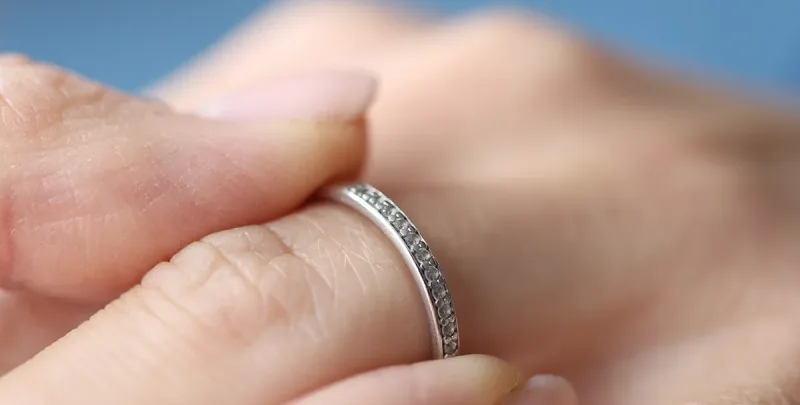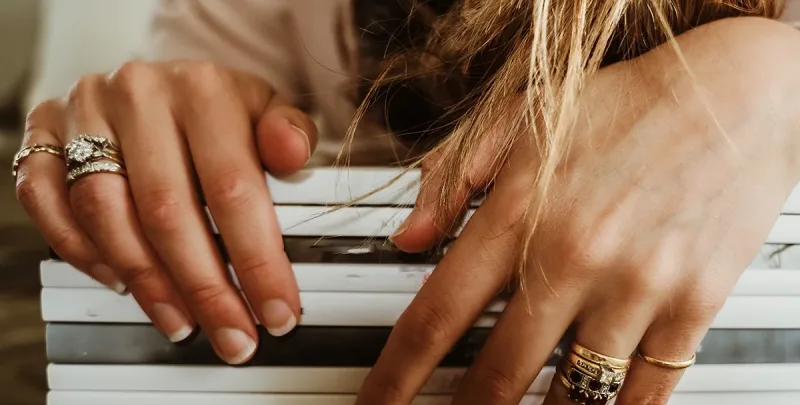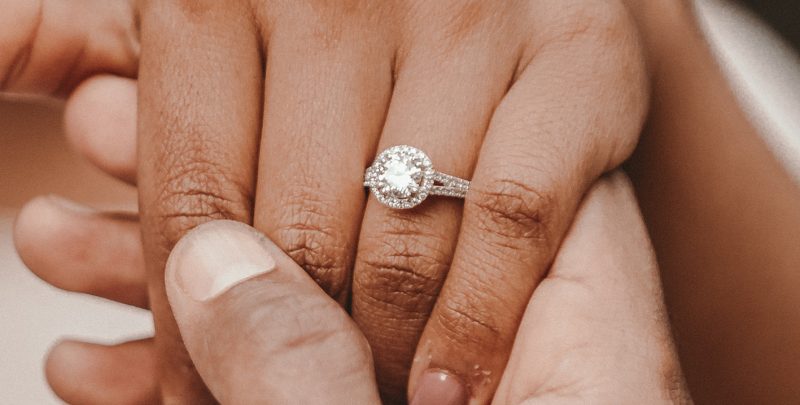A bold statement in modern jewellery
If you’re a follower of the latest jewellery trends, you may have noticed how chunky bombé-style rings have become a must-have accessory for those wanting to make a bold statement. And many industry commentators say the same thing – the chunky ring is back! (Not that it ever really went away).
Singer and songwriter Dua Lipa, for example, was seen on Instagram recently sporting a stunning, chunky bombé ring (rumoured to be from Tiffany & Co) on her engagement ring finger.
What are bombé-style rings?
Bombé-style rings are big, bold and beautiful! They are all about making a statement. The name alludes to the French word for 'bomb-shaped' (rounded, sculptural), perfectly describing its smooth, curvy elegance. These rings are a masterpiece on your finger.
You can get many different styles, with some bombé rings including details like enamel accents or large set gemstones adding a touch of colour and flair to their already eye-catching form.
And while dainty diamond rings are sophisticated and delicate, bombé rings are masculine, loud and proud – an authentic style statement.
Bombé rings offer a stark contrast to delicate, traditional designs, with an emphasis on volume and a sculptural appeal. The good news is that chunky rings can be incorporated into your current jewellery collection and even look good when stacked with smaller rings.
What are the origins of chunky jewellery?
It is unclear when bombé rings first rose to prominence, with some sources stating the Victorian era and others saying the Edwardian period. But what is clear is that around the end of the 19th century/early 20th century, the exceptionally durable platinum allowed ring designers to experiment with curves and intricate swirls freely.
The exuberance of the 1920s
Attention-grabbing, chunky cocktail rings were popular in the 1920s. After the hardships of World War I, people especially women were eager to embrace a life of glamour and self expression.
These striking rings, often featuring large, eye-catching stones and intricate designs, perfectly captured the spirit of the time. They served as a way for women to make a statement at lively parties and social gatherings, embodying both luxury and a break from traditional, understated jewellery styles.
Chunky rings were popular because they reflected the decade's exuberance, confidence, and desire for individuality.
Hollywood glamour and beyond
During the 1930s and 40s, actresses wore bold, chunky statement rings both on and off-screen.
Hollywood actresses often chose chunky rings because they made a strong style statement. These bold pieces caught the eye, adding a touch of glamour and helping to complete a memorable look.
In an industry where image is everything, a chunky ring could transform an outfit and signal luxury, confidence and success.
They were more than just accessories they were a way for stars to express their individuality and command attention on the red carpet and in everyday public appearances. For example, stars like Joan Crawford or Elizabeth Taylor reportedly wore large, striking pieces, typically made of platinum or gold.
The 1980s – go big or go home!
Fast forward to the 1980s, when fashion dictated that everything had to be big – big hair, big shoulder pads and big, chunky jewellery!
This decade was about grand gestures and bold designs, capturing the spirit of excess and individuality, making chunky rings a lasting inspiration for modern trends.
Chunky rings in the 2020s: Making a statement
Today, chunky rings are enjoying a resurgence. And they can suit everyone, whether you are looking for an engagement ring or an everyday piece.
And the great news is there are so many different types to choose from, whether vintage Art-Deco style, a 1960s Van Cleef & Arpels bombé dress ring, or a more contemporary Cartier pavé diamond 18ct yellow gold bombé style ring! The options are limitless!
Chunky rings vs traditional diamond rings
Not sure if a bombé ring is right for you? Should you go with a traditional, thin band, diamond ring or go big? What are the differences between the two?
First of all, chunky bombé rings offer something very different, looks-wise, to traditional diamond rings but both styles are beautiful.
Traditional versus edgy
Traditional, slimmer band, diamond rings tend to be subtle and classic, whereas a chunky bombé ring is all about making an impact. Its substantial, rounded design grabs attention and gives you an edgy look.
Some may believe that bombé rings let you express your individuality, with the creative, sculptural form suggesting a more artistic, contemporary vibe. In short, if you're after a piece of jewellery that turns heads and sets you apart from the crowd, a chunky bombé ring might be right for you.
Also, hunky bands allow you to wear a large stone without looking too showy, whereas the thinner bands on traditional diamond rings make a gemstone look bigger.
Comfort and durability
One crucial difference is the durability of the ring. Designed with a robust build, chunky bombé rings are eye-catching and built to last. Because the gemstones are typically embedded or encased inside the band (versus clawset/prong settings), they are less likely to get damaged or gemstones lost.
Peace of mind with ring insurance
Finally, don’t forget your bombé diamond ring insurance to protect your valuable rings from the unexpected - theft, accidental damage, or even loss. It gives you peace of mind, knowing that if something goes wrong, you won't have to shoulder the full cost of repair or replacement.
Find out more with our jewellery insurance FAQs here, or please call 0208 0033 190 for a ring insurance quote or further information.
Disclaimer:
This article's content is solely meant to be informative. It should not be regarded as expert advice or a definitive guide, even though every attempt has been made to ensure the correctness of the historical details. The information is a broad summary and might not include every historical viewpoint or cultural custom.


























